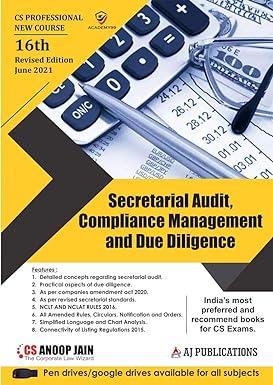Question
37.In case of a proposed highway project, the courts continued to insist that the authorities had not focused on the impact of the project on
37.In case of a proposed highway project, the courts continued to insist that the authorities had not focused on the impact of the project on a hospital in its neighborhood. The courts felt that the patients would be disturbed by the proposed project. The above is an example of:
Select one:
a. an aesthetic argument.
b. social fairness.
c. an environmental impact statement.
d. externalities.
e. incentives.
38.Which of the following statements holds true for the concept of reasonable consumer standard?
Select one:
a. It refers to an unwritten agreement formed between sellers and buyers as a function of their transaction.
b. It refers to the identification of consumers with the products he or she buys and an accompanying need to buy in order to exist.
c. It refers to a presumption that protections against deceitful advertising should only be extended to cover marketing efforts that would significantly mislead any consumer, including those much less sophisticated or experienced than typical buyers.
d. It refers to the consumers right to sue manufacturers for injuries caused by a defective product.
e. It refers to a presumption that protections against deceitful advertising should only be extended to cover marketing efforts that would significantly mislead a thoughtful, moderately experienced consumer.
39.Meg is a doctor by profession, but her real interest lies in water surfing. She limits the time that she spends as a medical professional, and tries to earn enough that would enable her to pursue her interest in water surfing. Megs attitude serves as an example of:
Select one:
a. institutionalism.
b. internationalism.
c. instrumentalism.
d. intellectualism.
e. insularism.
40.Which of the following statements holds true for the term, bribe?
Select one:
a. It refers to sum of money paid to a new employee by a company as an incentive to join that company.
b. It refers to a part of a contractually due sum that is paid in advance for services to be rendered.
c. It refers to a sum of money offered by hiring firms if the hired joins the company from a rival firm.
d. It refers to a system of payment for the temporary use of something owned by someone else.
e. It refers to something of value given to an individual to corrupt his or her professional judgment.
Step by Step Solution
There are 3 Steps involved in it
Step: 1

Get Instant Access to Expert-Tailored Solutions
See step-by-step solutions with expert insights and AI powered tools for academic success
Step: 2

Step: 3

Ace Your Homework with AI
Get the answers you need in no time with our AI-driven, step-by-step assistance
Get Started


